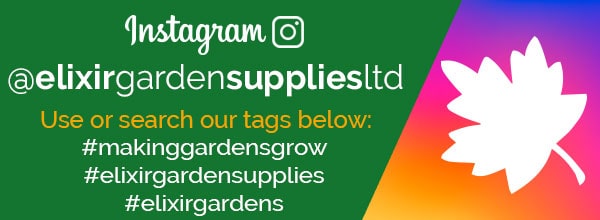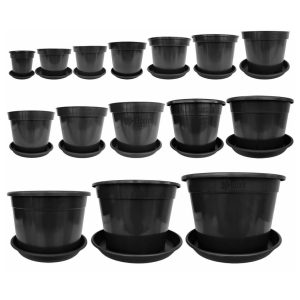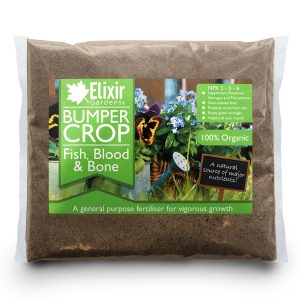Elixir Gardens Fertiliser & NPK Guide
Finding the right fertiliser can be daunting for new gardeners. Our guide will help you to understand what fertilisers are, the different forms they come in and how to work out which one you need.
This month we are sharing with you our knowledge on fertilisers, the different types and what NPK is exactly and how the varying nutrients can benefit your plants.
For instance: A lot of people treat fertilisers as a “one does all” – this is sometimes the case with products like Growmore 7-7-7 (all round balanced feed) or Fish Blood & Bone (a natural all round fertiliser). But a lot of the time, you can buy specialist feeds, made or advertised for one plant, which could actually benefit many plants in your garden! To find out more, keep reading.
Why use fertiliser?
All plants need to take nutrition on board to be able to survive. In general terms the better the feed, the better the plant health, and the higher the crop yield.
Plants are usually fed through their growing medium, soil, compost, water, etc. Although some fertilisers are given to plants through foliar feeding which is where the fertiliser is applied directly to the foliage.
Over time naturally occurring nutrients are taken up by the plants or are leached from the soil as rainwater naturally passes through it. Fertilisers not only replenish these nutrients, but are used to provide targeted nutrition for certain plant types.

What is NPK?
The three main cornerstones of fertilisers are Nitrogen (N), Phosphorous (P) and Potassium (K). Numbers, such as 7-7-7, represents the amount used of each of these components. In this case, 7-7-7 is a balanced all round fertiliser, more commonly known as Growmore.
N
Nitrogen
This makes it great for lawns and leafy vegetables. A good indication of lack of nitrogen is when leaves start to discolour (often turning yellow) from the leaf tip down. It will also show in slower, stunted growth, especially during spring when you would expect more rapid growth.
P
Phosphorus
It will promote stronger root systems and also make plants hardier during winter (think of winter crops such as cabbage, leeks, parsnips).
Plants lacking in phosphorous will tend to have spindly, thin stems, stunted growth and mature leaves that turn a dark bluish green. It will also reduce the ability to produce flowers, fruit and seeds.
K
Potassium
It will increase cell strength, the regulation water intake and help make the plant more resistant to disease. Potassium is also called ‘potash’.
If your plant is lacking in potassium then older leaves appear ‘burnt’ due to lack of water regulation. It can also affect root growth and stem strength. There will be less fruit/ /flower production and fruits will be less sweet and juicy.
Which type should I buy?
The fertiliser your use depends on the plant it is intended to feed.
Soluble and liquid fertiliser will give a quick boost as it’s readily taken up through roots. It can also be absorbed via the leaves if used as a sprayed foliar feed.
Granular fertiliser Is available in micro, mini and large granule forms. These can used as a base fertiliser when put into the hole or trench were plants are to go. Or, they can be used as a top dressing by mixing into the top few centimetres of soil before being watered in. Granular fertilisers are great for providing a slow release of nutrients over a longer period.

Elixir Gardens Nitrogen Fertilisers
Click an image to view the product
Elixir Gardens Phosphorus Fertilisers
Click an image to view the product
Elixir Gardens Potassium Fertilisers
Click an image to view the product
Our website offers a wide range of general and more specialist fertilisers. Each product shown also has helpful advice on what the fertiliser is used for, application rates, and when to use it.
Why use fertiliser?
All plants need to take nutrition on board to be able to survive. In general terms the better the feed, the better the plant health, and the higher the crop yield.
Plants are usually fed through their growing medium, soil, compost, water, etc. Although some fertilisers are given to plants through foliar feeding which is where the fertiliser is applied directly to the foliage.
Over time naturally occurring nutrients are taken up by the plants or are leached from the soil as rainwater naturally passes through it. Fertilisers not only replenish these nutrients, but are used to provide targeted nutrition for certain plant types.

What is NPK?
The three main cornerstones of fertilisers are Nitrogen (N), Phosphorous (P) and Potassium (K). Numbers, such as 7-7-7, represents the amount used of each of these components. In this case, 7-7-7 is a balanced all round fertiliser, more commonly known as Growmore.
N
Nitrogen
This makes it great for lawns and leafy vegetables. A good indication of lack of nitrogen is when leaves start to discolour (often turning yellow) from the leaf tip down. It will also show in slower, stunted growth, especially during spring when you would expect more rapid growth.
P
Phosphorus
It will promote stronger root systems and also make plants hardier during winter (think of winter crops such as cabbage, leeks, parsnips).
Plants lacking in phosphorous will tend to have spindly, thin stems, stunted growth and mature leaves that turn a dark bluish green. It will also reduce the ability to produce flowers, fruit and seeds.
K
Potassium
It will increase cell strength, the regulation water intake and help make the plant more resistant to disease. Potassium is also called ‘potash’.
If your plant is lacking in potassium then older leaves appear ‘burnt’ due to lack of water regulation. It can also affect root growth and stem strength. There will be less fruit/ /flower production and fruits will be less sweet and juicy.
Which type should I buy?
The fertiliser your use depends on the plant it is intended to feed.
Soluble and liquid fertiliser will give a quick boost as it’s readily taken up through roots. It can also be absorbed via the leaves if used as a sprayed foliar feed.
Granular fertiliser Is available in micro, mini and large granule forms. These can used as a base fertiliser when put into the hole or trench were plants are to go. Or, they can be used as a top dressing by mixing into the top few centimetres of soil before being watered in. Granular fertilisers are great for providing a slow release of nutrients over a longer period.

Elixir Gardens Nitrogen Fertilisers
Click an image to view the product
Elixir Gardens Phosphorus Fertilisers
Click an image to view the product
Elixir Gardens Potassium Fertilisers
Click an image to view the product
Our website offers a wide range of general and more specialist fertilisers. Each product shown also has helpful advice on what the fertiliser is used for, application rates, and when to use it.
More Products
Take a look at our selected products below and get the best from your garden.
-

Black Bird Netting | 1m-20m Widths & 1m-100m Lengths
£3.89 – £599.99 Select options This product has multiple variants. The options may be chosen on the product page -

Black Recycled Plastic Plant Pots and Saucers | Various Sizes
£6.79 – £188.29 Select options This product has multiple variants. The options may be chosen on the product page -

Bumper Crop Fish Blood & Bone Meal | Multi-Purpose Organic-Based Fertiliser
£5.99 – £40.99 Select options This product has multiple variants. The options may be chosen on the product page -

Complete Lawn 20kg | 4-in-1 Weed Feed & Moss Killer | 10-2-2+8Fe
£46.99 Select options This product has multiple variants. The options may be chosen on the product page -

COMPLETE LAWN 4 in 1 Weed, Feed & Moss Killer | 10-2-2+8 Fe
£5.99 – £59.89 Select options This product has multiple variants. The options may be chosen on the product page -

Green Bird Netting | 2m-10m Widths & 1m-100m Lengths
£4.89 – £179.99 Select options This product has multiple variants. The options may be chosen on the product page -

Large Black Round Pots with Reinforced Rim | 32 – 80 Litre Sizes | Available with Saucers
£10.99 – £188.29 Select options This product has multiple variants. The options may be chosen on the product page -

Roban25 Cut Wheat Rodent Poison | Strongest Available Online | 40g Sachets
£4.49 – £74.99 Select options This product has multiple variants. The options may be chosen on the product page -

Rodex25 Oktablok II Poison | Rat & Mouse Bait Blocks | 15 x 20g
£7.99 – £304.99 Select options This product has multiple variants. The options may be chosen on the product page -

Round Black Plastic Plant Pot Saucers / Water Trays | Various Sizes
£5.29 – £317.54 Select options This product has multiple variants. The options may be chosen on the product page











